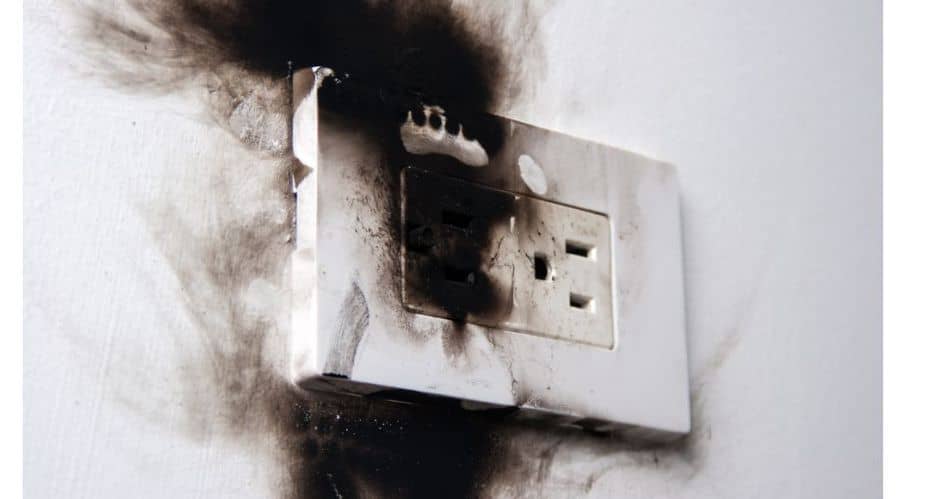
As the temperatures drop and winter sets in, it’s essential for homeowners to be mindful of the increased risk of electrical fires during the cold weather season. With heating devices, holiday decorations, and other electrical appliances in use, the potential for fires can rise significantly.
In this article, we’ll explore practical tips to help homeowners prevent electrical fires and ensure a safe and cozy winter season. By following these tips and staying vigilant, homeowners can reduce the risk of electrical fires and enjoy peace of mind throughout the colder months.
Understanding the Causes of Cold Weather Electrical Fires
Before delving into prevention tips, it’s crucial to understand the common causes of electrical fires during the winter months. Cold weather can exacerbate existing electrical issues, such as worn-out wiring, damaged outlets, and overloaded circuits.
Additionally, the use of heating devices and holiday decorations can put added strain on electrical systems, increasing the risk of fires. By addressing these potential hazards early on, homeowners can prevent electrical fires and protect their homes and families from harm.
Tip 1: Inspect and Maintain Electrical Systems Regularly
One of the most effective ways to prevent cold-weather electrical fires is to schedule regular inspections and maintenance of your electrical systems. Hiring a qualified electrician to inspect your wiring, outlets, and circuits can help identify potential hazards before they escalate into fires.
Be sure to check for signs of wear and tear, such as frayed wires or overheating outlets, and address any issues promptly to prevent fires. By staying proactive and addressing electrical issues promptly, homeowners can reduce the risk of electrical fires and ensure the safety of their homes.
Tip 2: Use Heating Devices Safely
Space heaters, electric blankets, and heating pads are essential for staying warm during the winter months, but they can also pose fire hazards if not used properly. When using heating devices, be sure to maintain proper clearance around them and never leave them unattended.
Follow the manufacturer’s instructions and safety guidelines closely to ensure safe operation and prevent fires. Additionally, consider investing in newer models with built-in safety features, such as automatic shutoff switches, to further reduce the risk of fire.
By using heating devices safely and responsibly, homeowners can stay warm and cozy without putting their homes at risk.
Tip 3: Be Mindful of Electrical Cord Safety
Overloaded electrical outlets and damaged cords are common culprits of electrical fires. Avoid overloading outlets with multiple devices, and use extension cords and power strips sparingly. Be sure to inspect cords regularly for signs of damage, such as fraying or exposed wires, and replace them as needed.
Additionally, avoid running cords under rugs or furniture where they can become damaged or overheated. By practicing good cord safety habits and addressing potential hazards early on, homeowners can reduce the risk of electrical fires and ensure the safety of their homes and families.
Tip 4: Install and Maintain Smoke Alarms
Smoke alarms are your first line of defense against electrical fires, so it’s crucial to have them installed in key areas of your home, including bedrooms, hallways, and living areas. Test your smoke alarms regularly and replace batteries at least once a year to ensure they are in working order.
Consider upgrading to interconnected smoke alarms, which can provide early detection of fires throughout your home. By ensuring that smoke alarms are installed and maintained properly, homeowners can receive early warnings of potential fires and take swift action to protect their homes and families.
Tip 5: Have an Emergency Plan in Place
In the event of a fire, having an emergency plan in place can save lives. Make sure all members of your household are familiar with the fire escape plan and know their roles and responsibilities.
Practice fire drills regularly to ensure everyone knows what to do in case of a fire emergency. Additionally, keep emergency contact numbers handy and have an emergency kit stocked with essential supplies, such as flashlights, batteries, and first aid supplies.
By being prepared and having an emergency plan in place, homeowners can respond quickly and effectively in the event of a fire and minimize potential damage and injuries.
Tip 6: Keep Electrical Appliances and Equipment Dry
Moisture and water can pose significant risks to electrical appliances and equipment, especially during the winter months. Keep electrical devices away from water sources and use weatherproof covers and enclosures for outdoor electrical components.
Be sure to protect outdoor electrical outlets and extension cords from rain, snow, and ice to prevent electrical hazards. By keeping electrical appliances and equipment dry and protected, homeowners can minimize the risk of electrical fires and ensure the safety of their homes.
Tip 7: Prepare for Power Outages and Emergencies
Power outages are common during the winter months, so it’s essential to be prepared. Consider investing in backup power sources, such as generators or battery-powered lights, to ensure you have electricity during outages.
If using a generator, be sure to follow safety guidelines and provide proper ventilation to prevent carbon monoxide poisoning. Additionally, keep an emergency kit stocked with essential supplies to help you weather power outages and other emergencies.
By preparing for power outages and emergencies, homeowners can ensure the safety and well-being of their families and minimize disruptions during the winter months.
Conclusion
Cold-weather electrical fires can pose significant risks to homes and families during the winter months, but with proper precautions and preventative measures, they can be easily avoided.
By inspecting and maintaining electrical systems regularly, using heating devices safely, practicing good cord safety habits, and installing smoke alarms, homeowners can reduce the risk of electrical fires and ensure the safety of their homes.
Additionally, having an emergency plan in place and preparing for power outages and emergencies can further enhance safety and peace of mind during the colder months. By following these tips and staying proactive, homeowners can enjoy a safe and cozy winter season without worrying about the threat of electrical fires.
